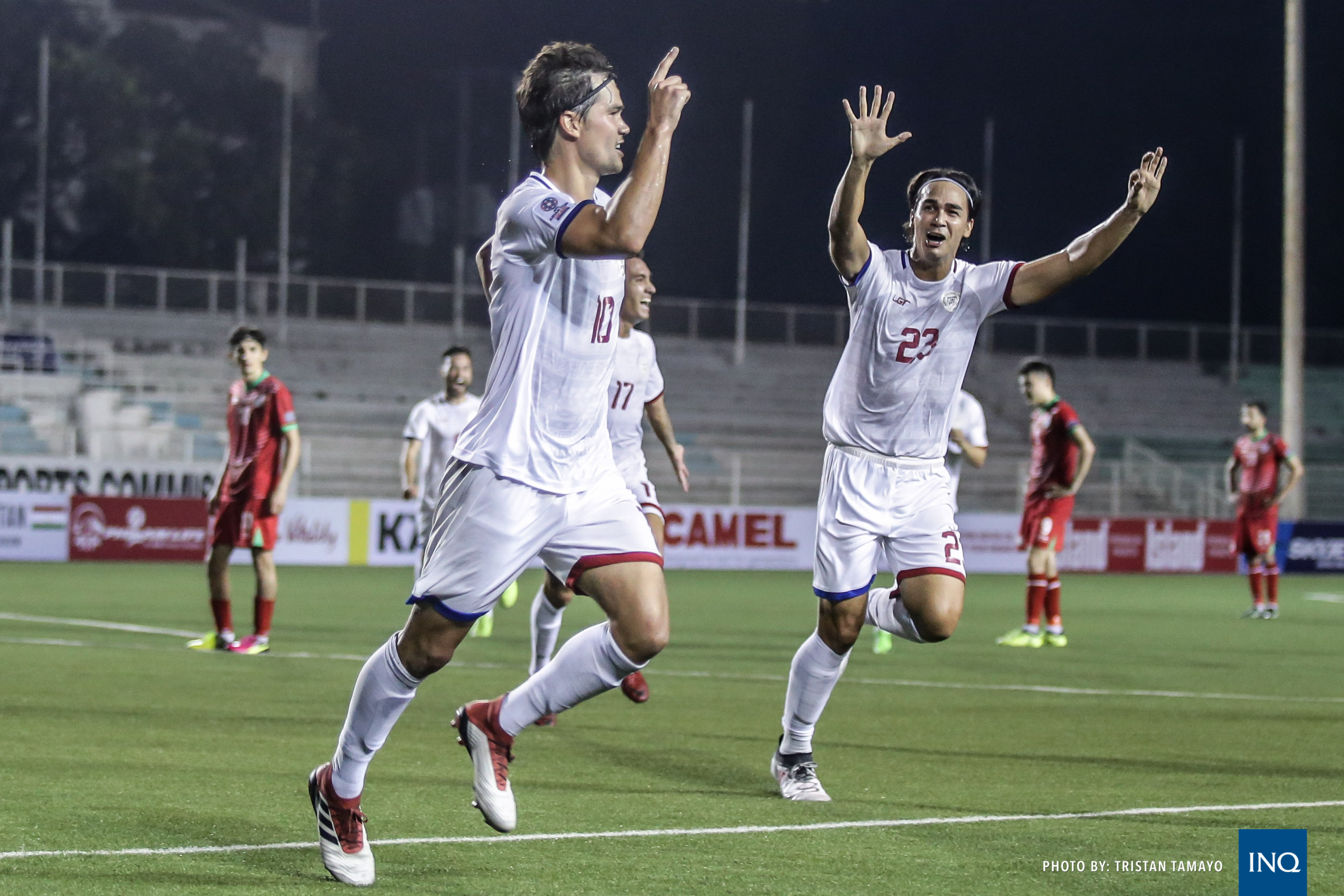
Photo By Tristan Tamayo/INQUIRER.NET
DUBAI—The bus that takes the Philippine team to training and to the stadium for its matches in the AFC Asian Cup here is covered with black decal with red, white and green linings depicting the logo of the continent’s biggest football tournament held for only the second time in the United Arab Emirates.
On each side of the bus and on the windshield, the word “Philippines” is written. But as you look closer, the phrase printed on each side immediately strikes a chord to a team that has gone through so much just to be among the 24 nations participating in this competition.
The phrase “To Dream The Impossible,” coined by organizers as the Azkals’ battlecry, couldn’t be more perfect as they relish their first Asian Cup experience in the Emirate.
Considering that just a decade ago, they were nowhere near this competition, being here is already a milestone in itself—a fact not lost on players like Phil and James Younghusband, who have been representing the country since 2005.
‘Surreal’
“It’s been an incredible journey and I think reaching the Asian Cup is a great way to mark a great milestone of what we’ve really achieved,” said Phil, the country’s top international scorer with 52 goals and also holds the record for most appearances with 105.
“It’s surreal when you put everything in perspective and you start to realize what an achievement it has been over the last 14 years. But we’re excited to be here and feel the Asian Cup vibe.”
“Still can’t believe we’re here,” James admitted. “It felt so recent that we qualified when we beat Tajikistan [last March] and Phil got his 50th goal. I still have emotions from that night.”
The first time Phil and James suited up for the country was in the 2005 Southeast Asian Games in Bacolod City and the Philippines failed to make it to the medal round.
The year before, the Philippine team that pulled off the so-called Miracle in Hanoi in the AFF Suzuki Cup was starting to take shape under coach Aris Caslib, who then had the likes of Aly Borromeo, Anton del Rosario, Chris Greatwich and Chieffy Caligdong in the AFF Championship.
“When I first wore the Philippine kit, all I was thinking about was the Southeast Asian Games and the AFF Suzuki Cup because we were qualifying in 2006,” Phil said.
“At that time, I didn’t really process or think about the long-term future and I think after that you start thinking how the Philippines can really go when you start creeping up the rankings; when we start qualifying for semifinals of the Suzuki Cup, then you really start thinking how far can this team really go.”
The recruitment of talented players with Filipino lineage who have played in leagues overseas much like the Younghusband brothers slowly changed the fortunes of the team and in 2010, with businessman Dan Palami as manager, the Azkals finally took off.
A stunning win in Vietnam triggered a wave of support back home, and also renewed interest from foreign-based Filipino players. When the Azkals qualified for the Asian Cup back in March in Manila, Palami candidly joked that the victory was worth his dwindling bank account.
“Somehow, it’s a relief that your belief of what the team can do has been rewarded with this participation [in the Asian Cup], but I think we can even do more,” said Palami. “We try to set our goals higher but at the same time we try to enjoy the moment being here in the Asian Cup right now and I think this is what the players are doing.”
Tournament debut
The Azkals begin their debut campaign in the Asian Cup on Monday against South Korea, a regular Asian representative in the Fifa World Cup. The two countries have not played against each other since 1978, when the Koreans beat the Filipinos, 5-0, in an AFC Asian Cup qualifying match in Manila.
The Azkals will also play China and Kyrgyzstan in the group stage and while they may be outsiders to reach the round of 16, the team has already set the benchmark for Philippine football.
“Somehow you try to expect and try to hope that you make something out of this,” said Palami. “You try to surprise Korea, maybe get out of the group stages.”
Swedish coach Sven-Goran Eriksson, who took England to two World Cup quarterfinals in 2002 and 2006, isn’t lacking in belief in his players.
“The players are very good,” he said. “One of the problems is that the Philippines is not a great football country. Basketball is [more] popular than football, but I think this generation of players have a golden opportunity to change that.”
It may be a stretch for the Azkals to change the country’s sporting landscape, but they are more than happy to showcase not just the Philippines’ footballing pedigree, but their uncanny fighting spirit here.
“What we’ve always done, we had the Philippine fighting spirit,” said Phil. “When it comes down to the pitch, we’re all fighting for each other, fighting for the country, that means a lot.”

